Arabic for the trail
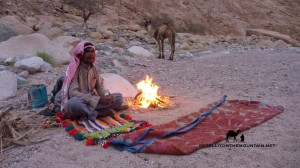 The Sinai and mainland Egypt are Arabic speaking regions but their dialects differ. You’ll still hear the mainland Egyptian dialect in the Sinai, especially in official places; and bigger towns, where lots of Egyptians live. Out in Bedouin areas, the dialect is different; it has more in common with classical than Egyptian Arabic. Anyway, that’s just something FYI: it won’t affect anything if you just speak a few words. And you should try to; in many parts of the Sinai, Arabic is the ONLY language. And no matter how little you speak; how stupid you think you sound, people will respect the effort. There are a few essential Arabic words are in the BEING BEDOUIN page; below, are ten more for the mountains. I’ll soon be uploading a Survival Arabic PDF too.
The Sinai and mainland Egypt are Arabic speaking regions but their dialects differ. You’ll still hear the mainland Egyptian dialect in the Sinai, especially in official places; and bigger towns, where lots of Egyptians live. Out in Bedouin areas, the dialect is different; it has more in common with classical than Egyptian Arabic. Anyway, that’s just something FYI: it won’t affect anything if you just speak a few words. And you should try to; in many parts of the Sinai, Arabic is the ONLY language. And no matter how little you speak; how stupid you think you sound, people will respect the effort. There are a few essential Arabic words are in the BEING BEDOUIN page; below, are ten more for the mountains. I’ll soon be uploading a Survival Arabic PDF too.
BEDOUIN ARABIC FOR THE TRAIL…
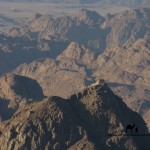 JEBEL – this means ‘mountain’ and it’s a good first word to learn. It’s said ‘Jebel’ – with a soft ‘J’ – across most of the Middle East, including in the Sinai; for mainland Egyptians, it’s ‘Gebel’. The most famous mountain in the Sinai is Jebel Musa (or as we say in English, Mount Sinai).
JEBEL – this means ‘mountain’ and it’s a good first word to learn. It’s said ‘Jebel’ – with a soft ‘J’ – across most of the Middle East, including in the Sinai; for mainland Egyptians, it’s ‘Gebel’. The most famous mountain in the Sinai is Jebel Musa (or as we say in English, Mount Sinai).
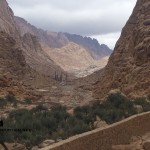 WADI – this means valley; and it’s another key word. Even in the mountains, you’ll probably spend most of your time in wadis. They can be big, or small, and are usually relatively flat; usually, when they’re very steep, they’re gullies or ravines. Wadi Feiran is one of the Sinai’s biggest wadis.
WADI – this means valley; and it’s another key word. Even in the mountains, you’ll probably spend most of your time in wadis. They can be big, or small, and are usually relatively flat; usually, when they’re very steep, they’re gullies or ravines. Wadi Feiran is one of the Sinai’s biggest wadis.
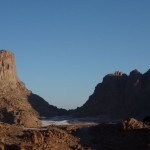 NAQB – this means a pass: usually a high, mountain pass that cuts between bigger ranges. But sometimes, just a lowland route between A and B. It’s one of the most common, useful words to know. Sometimes, the Bedouin say it ‘Nagb’, with a hard ‘G’ instead of a ‘Q’, but you’ll still recognise it.
NAQB – this means a pass: usually a high, mountain pass that cuts between bigger ranges. But sometimes, just a lowland route between A and B. It’s one of the most common, useful words to know. Sometimes, the Bedouin say it ‘Nagb’, with a hard ‘G’ instead of a ‘Q’, but you’ll still recognise it.
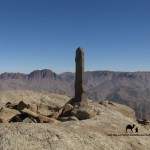 QIMMA – this means ‘peak’ or ‘summit’. As with Naqb, the Bedouin often say it ‘Gimma’, not ‘Qimma’. It’s a useful word to know because the word ‘Jebel’ alone doesn’t necessarily indicate a peak. It’s more the word for the whole mountain; its footslopes, cliffs, basins and everything else.
QIMMA – this means ‘peak’ or ‘summit’. As with Naqb, the Bedouin often say it ‘Gimma’, not ‘Qimma’. It’s a useful word to know because the word ‘Jebel’ alone doesn’t necessarily indicate a peak. It’s more the word for the whole mountain; its footslopes, cliffs, basins and everything else.
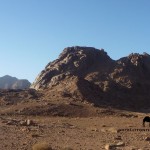 FARSH – usually a small, rocky basin surrounded by higher ground. It could be small – something just a few paces across – or much bigger; even the size of a few football pitches. It can also be used for any general flat area too. Farsh Eliyas is a well-known basin on Mount Sinai.
FARSH – usually a small, rocky basin surrounded by higher ground. It could be small – something just a few paces across – or much bigger; even the size of a few football pitches. It can also be used for any general flat area too. Farsh Eliyas is a well-known basin on Mount Sinai.
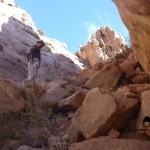 SHEGEEF – a shegeef is a gully: which is to say, a steep, narrow passageway, usually in high, rocky ground. This is an important word to learn for climbing in the Sinai; gullies often give the main way through the mountains; some of them even go direct to the summit.
SHEGEEF – a shegeef is a gully: which is to say, a steep, narrow passageway, usually in high, rocky ground. This is an important word to learn for climbing in the Sinai; gullies often give the main way through the mountains; some of them even go direct to the summit.
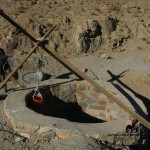 BEER – this’ll be an easy one for most to remember. It means ‘well’ in Arabic and it usually indicates a proper shaft dug into the ground; but NOT always. Nor does it say anything about the quality of the shaft; or if it is rigged with a bucket and pulley system to draw water up from below.
BEER – this’ll be an easy one for most to remember. It means ‘well’ in Arabic and it usually indicates a proper shaft dug into the ground; but NOT always. Nor does it say anything about the quality of the shaft; or if it is rigged with a bucket and pulley system to draw water up from below.
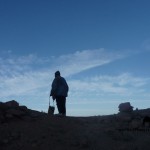 TAREEG – this means a ‘way’ or ‘route’ to a place. A lot of the time, it just shows there is a way; ie that it is possible to go from A to B, usually without too much difficulty. It might – or might not – indicate an actual path. Darb or sikka are the Bedouin words for a hard, beaten trail.
TAREEG – this means a ‘way’ or ‘route’ to a place. A lot of the time, it just shows there is a way; ie that it is possible to go from A to B, usually without too much difficulty. It might – or might not – indicate an actual path. Darb or sikka are the Bedouin words for a hard, beaten trail.
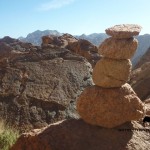 ROJOM – a rojom is a small, trail-marking stone. They’re common in places where there’s no obvious path; or where it’s hard to navigate for other reasons. They’re usually small piles of stones, and you can go from one to the next, following them in a long line from A to B until you’re through.
ROJOM – a rojom is a small, trail-marking stone. They’re common in places where there’s no obvious path; or where it’s hard to navigate for other reasons. They’re usually small piles of stones, and you can go from one to the next, following them in a long line from A to B until you’re through.
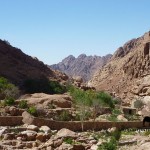 JINAYNA – this means garden; it’s usually a small orchard, surrounded by stone walls. It’s a useful word in the mountains near St Katherine, where there are hundreds of gardens; and which all give useful reference points for getting around. Shejera is the word for tree; trees can often be useful navigational features too.
JINAYNA – this means garden; it’s usually a small orchard, surrounded by stone walls. It’s a useful word in the mountains near St Katherine, where there are hundreds of gardens; and which all give useful reference points for getting around. Shejera is the word for tree; trees can often be useful navigational features too.